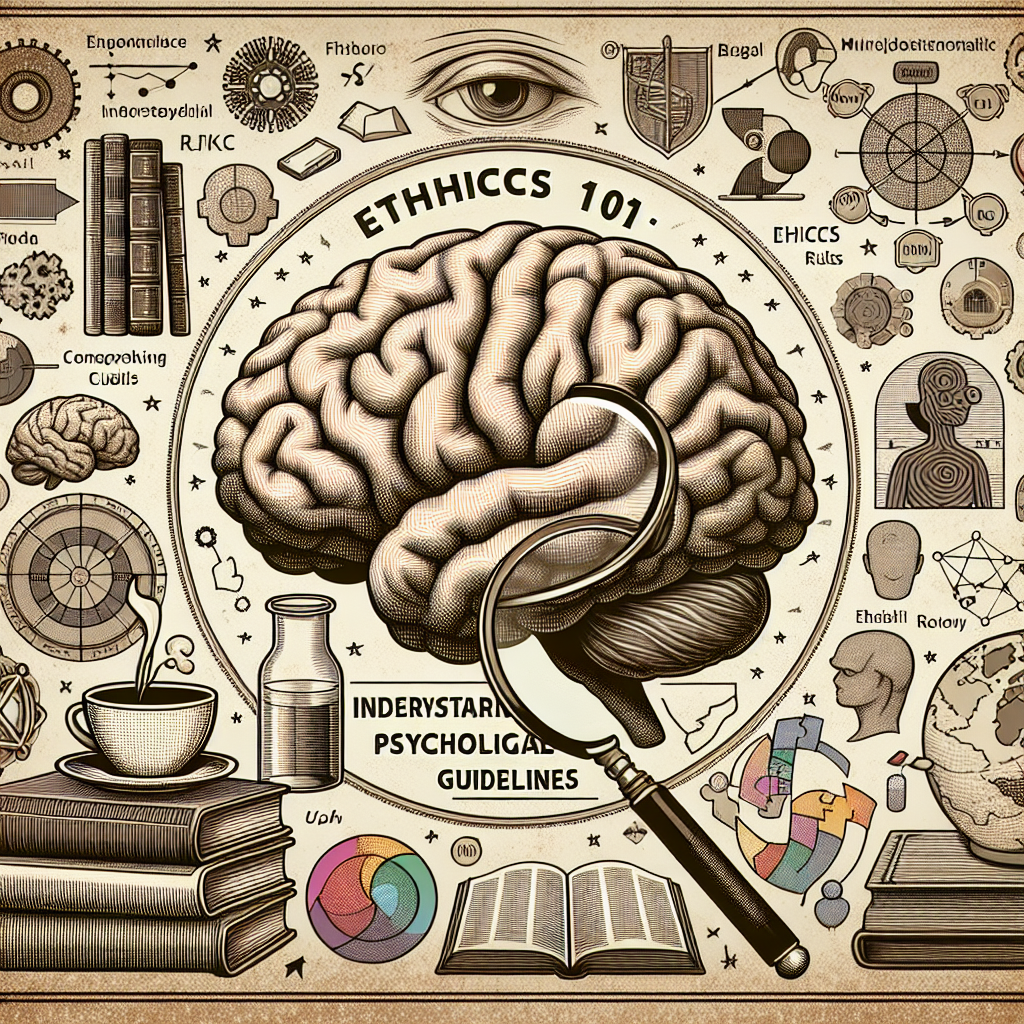
Ethics 101: A Beginner’s Guide to Understanding Psychological Research Guidelines
In an era when information is highly accessible, understanding the ethical implications of psychological research is more crucial than ever. Whether you’re a budding psychologist, a curious student, or a concerned citizen, it’s essential to comprehend the ethical guidelines that govern psychological studies. Welcome to "Ethics 101: A Beginner’s Guide to Understanding Psychological Research Guidelines." This guide aims to illuminate the ethical principles that ensure research is conducted with integrity, respect, and a commitment to the welfare of participants.
Introduction
Imagine being part of a groundbreaking psychological study that could help thousands, yet feeling uneasy about how your data is collected and managed. Ethical guidelines in psychological research exist to protect participants and assure research validity. This guide will walk you through these essential principles, helping you grasp the importance of ethics in psychology, analyze case studies, and ultimately appreciate how integrity shapes the field.
The Foundation of Ethical Psychological Research
What Are Ethical Guidelines?
Ethical guidelines in psychological research are frameworks that ensure the dignity, rights, and welfare of individuals participating in studies. These guidelines help researchers navigate complex moral dilemmas, ensuring that their work adheres to standards that protect both participants and the integrity of the research.
Core Ethical Principles
The American Psychological Association (APA) outlines several core ethical principles that serve as fundamental pillars in the field of psychology. These include:
Informed Consent: Participants must be fully aware of the nature of the study, the risks involved, and their right to withdraw at any time.
Confidentiality: Researchers are required to keep participants’ information confidential and secure.
Debriefing: After participation, participants should be informed about the study’s purpose and any deception used.
Integrity and Honesty: Researchers must report their findings honestly and not manipulate data.
- Respect for Persons: This principle emphasizes the importance of treating individuals as autonomous agents worthy of respect.
Case Study: The Stanford Prison Experiment
An iconic illustration of these ethical principles can be found in the Stanford Prison Experiment. Conducted in 1971 by psychologist Philip Zimbardo, the experiment sought to explore the psychological effects of perceived power. However, it quickly spiraled into a situation where participants, assigned roles as guards and prisoners, faced extreme emotional stress.
Analysis
Though the study provided significant insights into human behavior under authority, it also raised critical ethical concerns. The lack of informed consent regarding the psychological risks, coupled with inadequate debriefing, highlighted the imperative need for stricter ethical guidelines in psychological research.
Navigating the Research Process: Ethics in Action
Developing Research Proposals
When starting a new study, ethical considerations should be an integral part of the proposal. Outlining how you will address informed consent, confidentiality, and participant welfare should be a top priority.
Table: Key Components of a Research Proposal
| Component | Description |
|---|---|
| Title of Study | A clear and concise title for the research. |
| Purpose of Research | Objectives and goals of the study. |
| Methodology | Outline of the research methods used. |
| Ethical Guidelines | How ethical standards will be upheld. |
Conducting the Research
Once a proposal is approved, adherence to ethical guidelines continues throughout the research process. This includes:
Monitoring Participant Welfare: Checking in with participants regularly to ensure their well-being.
- Flexible Participation: Allowing participants to opt-out at any time without consequences.
Case Study: Milgram’s Obedience Study
Another pertinent example is Stanley Milgram’s Obedience Study, conducted in the 1960s. Participants were instructed to administer electric shocks to a learner, ostensibly as part of a learning experiment. Despite the apparent distress of the learner, many continued to obey instructions.
Analysis
Milgram’s study raised questions about informed consent and the psychological impact on participants. While the findings shed light on authority and obedience, the ethical concerns prompted a reevaluation of research practices that involve potential harm to participants.
Ethical Review Boards: Guardians of Ethical Standards
The establishment of Institutional Review Boards (IRBs) marked a significant step toward enhancing ethical standards in psychological research. These boards evaluate research proposals, ensuring that ethical guidelines are adhered to before studies commence.
Role and Responsibilities of IRBs
- Reviewing Proposals: Scrutinizing study designs for ethical compliance.
- Ensuring Participant Safety: Assessing risks and making recommendations to mitigate them.
- Monitoring Ongoing Research: Overseeing studies to ensure continuing adherence to ethical standards.
Chart: IRB Review Process
| Step | Description |
|---|---|
| Submission | Researcher submits proposal to the IRB. |
| Review | IRB reviews the proposal for ethical issues. |
| Approval | If ethical standards are met, approval is granted. |
| Monitoring | Ongoing studies are periodically reviewed. |
The Impact of Cultural Competence on Ethics
Why Cultural Competence Matters
In today’s diverse society, understanding cultural differences is vital for ethical research practices. Researchers must be aware of cultural nuances that may influence participant experiences and perceptions, incorporating culturally sensitive methods to ensure respect and integrity.
Incorporating Cultural Considerations
- Inclusive Sampling: Ensuring diverse participant representation.
- Culturally Relevant Methods: Utilizing approaches that resonate with different cultural values and practices.
Case Study: Cross-Cultural Research Challenges
Imagine a study examining mental health in various countries. Research that fails to consider cultural context may offer skewed results, leading to ineffective treatment recommendations. Ethical researchers prioritize culturally relevant methodologies to ensure validity and respect.
Addressing Ethical Violations
The Consequences of Unethical Research
When ethical guidelines are disregarded, the repercussions can be profound, both for participants and the field of psychology. Ethical violations can undermine public trust, jeopardize the validity of research findings, and lead to legal consequences.
Case Study: Tuskegee Syphilis Study
One of the most notorious examples is the Tuskegee Syphilis Study, which deceived and exploited African American men with syphilis. The study continued for decades without informing the participants that they were being denied treatment, highlighting the absolute necessity of ethical standards.
Analysis
The long-term effects of the Tuskegee Study are visible even today, sparking mistrust in medical and psychological research among minority populations. It serves as a reminder that ethics should guide every phase of research.
Conclusion
Understanding the ethical guidelines governing psychological research is not just a theoretical exercise; it’s a moral imperative. As we’ve explored in this guide, the principles of informed consent, confidentiality, and respect for persons are pivotal in safeguarding participant welfare and ensuring the integrity of research.
As you venture into the world of psychological research, carry these lessons with you. Uphold ethical integrity in your work, recognize the cultural nuances that shape human behavior, and, most importantly, create an environment where respect and dignity are paramount. Remember, in the quest for knowledge, ethics must always prevail.
FAQs
1. What are the main ethical guidelines in psychological research?
The main ethical guidelines include informed consent, confidentiality, debriefing, integrity, and respect for persons.
2. What is informed consent?
Informed consent requires researchers to provide participants with all relevant information about the study, including any potential risks, and allows them to withdraw at any time without penalty.
3. How do ethical review boards impact psychological research?
IRBs review research proposals to ensure they adhere to ethical standards, protect participant welfare, and monitor ongoing studies for compliance.
4. Why is cultural competence important in ethical research?
Cultural competence ensures that researchers understand cultural nuances that may affect participants, allowing for more valid and respectful research practices.
5. What are the consequences of unethical research?
Unethical research can undermine public trust, invalidate study findings, and lead to serious legal and social repercussions.
By prioritizing ethical standards, we can foster a culture of trust and respect in psychology, ultimately benefiting all who engage in this vital field.















